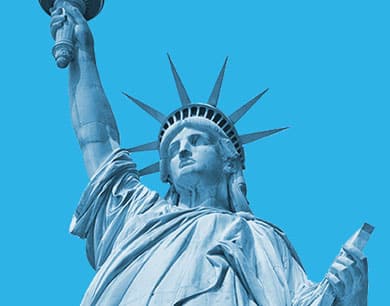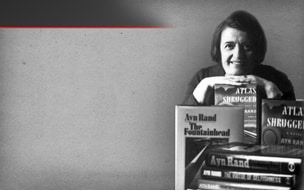Ayn Rand’s philosophy, Objectivism, begins by embracing the basic fact that existence exists. Reality is, and in the quest to live we must discover reality’s nature and learn to act successfully in it.
To exist is to be something, to possess a specific identity. This is the Law of Identity: A is A. Facts are facts, independent of any consciousness. No amount of passionate wishing, desperate longing or hopeful pleading can alter the facts. Nor will ignoring or evading the facts erase them: the facts remain, immutable.
In Rand’s philosophy, reality is not to be rewritten or escaped, but, solemnly and proudly, faced. One of her favorite sayings is Francis Bacon’s: “Nature, to be commanded, must be obeyed.”
Reality — that which exists — has no alternatives, no competitors, nothing “transcending” it. To embrace existence is to reject all notions of the supernatural and the mystical, including God.

In Rand’s philosophy, reality exists as an objective absolute, impervious to our wishes or desires. But our capacity for thought gives us the ability to understand reality and the choice to use this knowledge to create the new and the life-sustaining. “The power to rearrange the combinations of natural elements is the only creative power man possesses,” Rand writes. “It is an enormous and glorious power — and it is the only meaning of the concept ‘creative.’”
The primacy of existence (of reality) is the axiom that existence exists, i.e., that the universe exists independent of consciousness (of any consciousness). . . . To grasp the axiom that existence exists, means to grasp the fact that nature, i.e., the universe as a whole, cannot be created or annihilated, that it cannot come into or go out of existence. Whether its basic constituent elements are atoms, or subatomic particles, or some yet undiscovered forms of energy, it is not ruled by a consciousness or by will or by chance, but by the Law of Identity. . . . Nature is the metaphysically given — i.e., the nature of nature is outside the power of any volition.
Metaphysics is the fundamental branch of philosophy, which shapes all the rest. In particular, Rand held that the issue of the primacy of existence vs. the primacy of consciousness is a basic divide, with life-and-death consequences. This issue shapes whether and how we try to pursue knowledge, our confidence in the power of our own minds, our view of what possibilities in life are open to us, our stand on the nature and source of values, our understanding of rights, and the importance we grant to art.
These links will help you explore some of these fascinating connections.
The best way to learn Objectivism is to read Ayn Rand’s books.
Start now by reading Atlas Shrugged:
The essential advice of Rand’s philosophy is: embrace reason as an absolute. This means: choose to face the facts at all times, in all areas, whether at work or at home, in business or in love — and no matter what conclusion logically ensues, whether pleasant or unpleasant.
The purpose of epistemology is to help teach us how to reason: how to think conceptually, how to properly define our terms, how to form and apply principles.
Reason doesn’t work automatically. We have to choose to activate our minds, to set them in motion, to direct them to the task of understanding the facts, and to actively perform the steps that such understanding requires. Our basic choice in life is “to think or not.”
To choose to follow reason, Rand argues, is to reject emotions, faith or any form of authoritarianism as guides in life.

In Rand’s view, to embrace reason is the root of an individual’s moral stature and of mankind’s progress, including the struggle for freedom. The rejection of reason is the source of an individual’s evil and of history’s many centuries of stagnation, retrogression and oppression.
Thinking is man’s only basic virtue, from which all the others proceed. And his basic vice, the source of all his evils, is that nameless act which all of you practice, but struggle never to admit: the act of blanking out, the willful suspension of one’s consciousness, the refusal to think — not blindness, but the refusal to see; not ignorance, but the refusal to know. It is the act of unfocusing your mind and inducing an inner fog to escape the responsibility of judgment — on the unstated premise that a thing will not exist if only you refuse to identify it, that A will not be A so long as you do not pronounce the verdict ‘It is.’
Ayn Rand on Reason
Epistemology studies the nature and means of human knowledge. “Does man acquire knowledge by a process of reason — or by sudden revelation from a supernatural power? Is reason a faculty that identifies and integrates the material provided by man’s senses — or is it fed by innate ideas, implanted in man’s mind before he was born? Is reason competent to perceive reality — or does man possess some other cognitive faculty which is superior to reason? Can man achieve certainty — or is he doomed to perpetual doubt?”
The answers to these questions, Rand contends, make a life-and-death difference to an individual and a culture. These links will help you explore why.
Why does man need morality?
The typical answer is that we must learn to deny our own interests and happiness in order to serve God or other people — and morality will teach us to do this.
Rand’s answer is radically different. The purpose of morality, she argues, is to teach us what is in our self-interest, what produces happiness.
“Man has,” she observes, “no automatic code of survival. . . . His senses do not tell him automatically what is good for him or evil, what will benefit his life or endanger it, what goals he should pursue and what means will achieve them, what values his life depends on, what course of action it requires.”
This is what the science of ethics studies — and what Objectivism offers. “Man must choose his actions, values and goals,” she summarizes, “by the standard of that which is proper to man — in order to achieve, maintain, fulfill and enjoy that ultimate value, that end in itself, which is his own life.”

Rand consciously saw herself as a moral radical and revolutionary, who challenges both the conventional damnation of selfishness as evil and the conventional glorification of altruism, the doctrine that man must live for others, as good.
She argues that selfishness, properly understood, does not mean doing whatever you feel like doing or exploiting others, and that altruism does not mean benevolence or goodwill but the opposite.
The Objectivist ethics holds that the actor must always be the beneficiary of his action and that man must act for his own rational self-interest. But his right to do so is derived from his nature as man and from the function of moral values in human life — and, therefore, is applicable only in the context of a rational, objectively demonstrated and validated code of moral principles which define and determine his actual self-interest. It is not a license “to do as he pleases” and it is not applicable to the altruists’ image of a “selfish” brute nor to any man motivated by irrational emotions, feelings, urges, wishes or whims.
Ayn Rand on the Pursuit of Happiness
Ethics, according to Rand, is a science. It studies the values you must achieve and the virtues you must practice to attain happiness.
Crucial to this science is a concrete projection of the moral ideal, a vision of what you should be seeking to embody in your soul. “An exhaustive philosophical treatise defining moral values, with a long list of virtues to be practiced,” she writes, “will not do it; it will not convey what an ideal man would be like and how he would act . . . . There is no way to integrate such a sum without projecting an actual human figure — an integrated concretization that illuminates the theory and makes it intelligible.”
Only art can do this. Rand’s stated goal as a fiction writer is the projection of an ideal man; her nonfiction is the theory behind that vision.
To understand Rand’s new morality, therefore, you must explore both her novels and nonfiction, which these links will help you to do.
The ideal social system, Rand holds, is laissez-faire capitalism. Economically, this means not today’s mixture of freedom and government controls but “a complete separation of state and economics, in the same way and for the same reasons as the separation of state and church.”
Rand’s advocacy of laissez-faire capitalism is a consequence of her deeper philosophical views. An individual who eagerly faces reality, who embraces his own rational mind as an absolute, and who makes his own life his highest moral purpose will demand his freedom. He will demand the freedom to think and speak, to earn property and associate and trade, and to pursue his own happiness.
Laissez-faire capitalism, Rand argues, is the system of individual rights. In such a system the government has only one function, albeit a vital one: to protect the rights of each individual by placing the retaliatory use of physical force under objective control.

Rand stresses that reason is man’s basic means of survival, the source of all the knowledge and values that advance human life. By enshrining individual rights as its foundational principle, laissez-faire capitalism systematically protects the individual’s ability to live by reason.
The source of man’s rights is not divine law or congressional law, but the law of identity. A is A — and Man is Man. Rights are conditions of existence required by man’s nature for his proper survival. If man is to live on earth, it is right for him to use his mind, it is right to act on his own free judgment, it is right to work for his values and to keep the product of his work. If life on earth is his purpose, he has a right to live as a rational being: nature forbids him the irrational.
Ayn Rand on the Founding Fathers
Rand holds that laissez-faire capitalism is the “unknown ideal.”
It is unknown because, despite the incredible progress it created in the 19th century as various countries approached full capitalism, the “flood of misinformation, misrepresentation, distortion, and outright falsehood about capitalism is such that the young people of today have no idea . . . of its actual nature.”
The discrediting succeeded, Rand says, because capitalism’s defenders evaded the clash between capitalism and altruism. Capitalism protects the individual’s selfish pursuit of happiness; conventional morality demands self-sacrificial service to others.
But capitalism is the ideal, because only under it can one fully live a life of reason, purpose and self-esteem. These links will help you explore Rand’s fascinating viewpoint.

Subscribe to receive timely updates. You’ll be the first to learn about our latest initiatives and program successes and how you can help ARI achieve its mission to spearhead a cultural renaissance of reason, rational self-interest, individual rights and laissez-faire capitalism. Now more than ever, it’s an exciting time to engage with ARI.